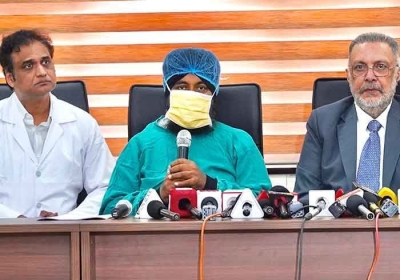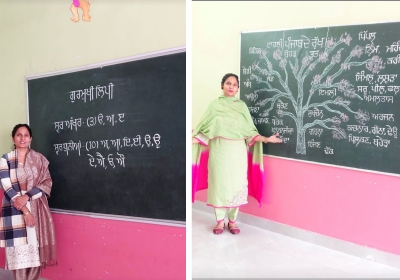
HJM members point to a loudspeaker they had installed outside Routi mosque.
Azan could be drowned out by loudspeaker music
Hum loudspeaker se zyada tez song bajayenge, jab jab azan bajege. Is video ko viral kariye, ye message pure Hindustan me jana chahiye (Whenever the azan plays, we will increase the volume of the song on the loudspeaker.) In a 30-second viral video shot in Madhya Pradesh’s Ratlam district on January 31, an agitated young man standing with a group outside Routi mosque can be heard saying, “Make this video viral, this message should go across India),” an agitated young man standing with a group outside Routi mosque can be heard saying.
The man in the video can be seen pointing to a building directly across from the Raoti mosque that had just been installed with a loudspeaker to drown out the azan. The enraged youngsters exclaimed in the now-viral video that their azan memoranda to the police had gone unanswered, leading them to set up loudspeakers in front of the mosque to disturb it.
The video went viral two days after members of the RSS-affiliated Hindu Jagran Manch (HJM) presented a memorandum to the Raoti police station in Ratlam district on January 29 asking for a ban on loudspeaker azan.
Overnight, the video became viral. The next day, Ratlam police arrived in the area and ordered Muslims to turn down the level of the mosque’s loudspeaker. At the same time, the police took down a loudspeaker that had been set up on the building opposite the mosque by local youngsters.
We spoke with the villagers and encouraged both sides to keep the peace. “No action has been taken against the youth who made the contentious video since the incident was resolved peacefully,” Ram Singh, town inspector of Raoti police station, told The Wire.
Memorandums demanding the removal of loudspeakers from mosques have been filed to police stations across the country, including Roati. The Hindu Jagran Manch submitted the same two-page memorandum to all 310 police stations in the 15 districts of Madhya Pradesh’s Malwa area between January 29, 2022 and February 2, 2022, according to Aashish Basu, the HJM's Malwa Prant Pramukh.
The Islamic call to prayer, uttered by a muezzin at set times throughout the day, is known as azan. In India, the azan is chanted five times a day from the mosque.
A group of about 50 men linked with the HJM, together with locals, delivered memorandums to police stations in Ratlam, Khandwa, Barwani, Dhar, and Ujjain, demanding the authorities to restrict loudspeakers at mosques. The HJM personnel read the whole two-page memo in front of police and workers before turning over the papers.
“It came to my knowledge that memos were given at various police stations,” Aditya Pratap Singh, superintendent of police, Dhar district, told The Wire. “Since it’s a controversial issue, we’re looking into the legal aspects of it.”
HJM alleged in a two-page memorandum that azan was played five times a day on loudspeakers without permission. Hindus, on the other hand, must obtain permission from several offices in order to organise religious programmes or build pandals during festivals.
“If an Islamic country like Saudi Arabia can ban the use of loudspeakers, why couldn’t this happen in India?” the memorandum asks, referring to Saudi Arabia’s decision on June 1, 2021 to limit the level of mosque loudspeakers in response to complaints about excessive noise. It should be put to an end right away.”
Apart from the HJM, on January 16, a group of Indore attorneys delivered a memo to various police stations in the city, including Juni police station, requesting that loudspeakers be removed from mosques since they are causing “nuisance.”
Right-wing activists handed over a similar statement to Indore’s Raoji Bazar police station on January 24, alleging that they are having problems with the azan and that if it does not cease, Hindus will not only play loud music during the azan but will also “harass Muslims in this neighbourhood.”
Twitter-
“Ye ek shuruaat hai, ye ek rastriya mudda banne ja raha ha,” a member of a right-wing group can be heard saying to the town inspector of Raoji Bazar police station in a video of the event. Isko gambhirta se lijye (This is just the beginning; it will grow into a national issue.) Please take this carefully.)”
“The memo was delivered by members of Vishwa Hindu Parishad and Bajrang Dal, not by HJM,” Aashish Basu of the HJM claimed when asked about the Indore Raoji Bazar police station incident.
However, Rajesh Tiwari, the VHP and Bajrang Dal leader for Madhya Pradesh and Chhattisgarh, denied launching any such anti-azan campaign. “I haven’t seen the video,” he remarked when asked about the Indore’s Raoji incident, in which VHP and Bajrang Dal men can be seen passing over papers. As a result, I’m unable to comment.”
Basu did, however, clarify what prompted him to initiate an anti-azan campaign at a time when elections in five states are taking place. “It [the order] came from top officials following reports that Muslims in Turk Bagri hamlet in Dhar district complained to police about loud music being played during a religious event, and police threatened the organisers,” Basu added.
“The campaign against azan has been launched to keep the communal flame alive ahead of assembly elections in five states and upcoming panchayat polls in Madhya Pradesh,” Indore shahar Qazi Ishrat Ali said, contradicting Basu’s claim that the HJM’s anti-azan campaign is unrelated to the ongoing elections.
“Azan is only an announcement from a mosque to inform people of namaz, and it lasts less than 2-3 minutes,” he continued. Furthermore, every person of India is guaranteed the right to profess and propagate the religion of their choosing under Article 25 of the Indian Constitution.”
According to the 2011 Census, the Muslim population of Madhya Pradesh is less than 7%. The Malwa Nimar region of the state is home to more than 80% of the state’s Muslim population.





